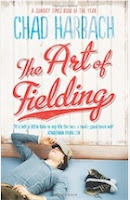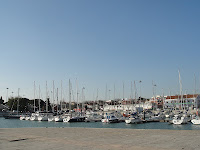Sunday, October 07, 2012
Wednesday, July 11, 2012
Disappointment
Today I have a job that gives me weekends. That is definitely not 24x7. That does not turn me into an anxious, frazzled wreck. Now I truly have the time to do all the things I really want to do. And what do I do?
Spend my mornings on Facebook and Pinterest, evenings on comedy central, my weekends watching movies I have watched a hundred times before. I used to be more regular at the gym a year back. A year back my blog had double the number of posts in the same time. I met my friends more often (I had more friends) and had more interesting conversations.
If I ask myself why this is so, I have no real answer. Maybe all this time on my hands rattles me. It might be that my innate laziness takes over and I would rather vegetate than work at something, even if that something should excite me. Or maybe, just maybe, hard work has a self-feeding mechanism – it makes you work even harder. A stressed out advertising executive makes time to pen that poem or get up an hour earlier to go to the gym because she feels compelled to make the little time she has count! Who knows why?
All I know is, I disappoint myself. The past year, I have found myself slipping back, not pushing myself enough, not being hungry enough. I need to wake myself up from this inertia. I need to get serious about my hobbies.
Saturday, June 02, 2012
Saturday, May 26, 2012
Sunday, April 08, 2012
Reading her is like reading a contemporary Thoreau. Or even a Whitman. A lot of her nature descriptions don’t hold particular relevance to a city-dweller like me. But the sheer joy she finds in the birds and the trees and the water bodies, the connections she establishes between the natural order of things and modern contemporary life, the importance she places on just sheer attentiveness to the world around, makes her a precious piece of extraordinariness in an otherwise ordinary Sunday evening.
Thursday, March 08, 2012

The Valley of Masks
By Tarun Tejpal
Tejpal has attempted an Animal Farm. Or a 1984. The Valley of Masks is a fable in the Orwellian fashion, of a society that breaks away from the real, messy, filth-ridden world to create a Platonian Utopia. A world of perfection where everyone is equal, there are no possessions, there is no sense of self, only a striving towards an elimination of self.
The narrator is one who breaks away. And as he waits for his retribution, he tells his tale. It’s a fast paced tale, fascinating and thriller-like, and as he recreates the perfect Utopian world he comes from, you can see in it facets of all the religions and all the big ideologies – Jesus, Marx and the Buddha, the Gita and the Koran. And you can see in it all the fallacies of the quest for the one right way.
Tejpal, in the voice of Karna (born Karna, but growing into a Wafadar with a name with 2 numerals and 1 alphabet) describes his birth and growing up in a society where there are no mothers, only the motherhood, where you are taught to eschew anything to do with ‘I’, where individuality is subsumed under the collective ‘we’, where ‘purity’ of thought and action is valued over anything else, where the truth of the Aum is deemed greater than Aum himself. Aum is the prophet, the great one who led his flock to the Promised Land. And his disciples understandably, set up Utopia.
Of course the Utopia gets dystopian. The quest for perfection is flawed. Because there is music (“We sing and we hear song, and we understand and we forgive, and our great unhappiness slowly drains out of us, like pus from a boil, and we sheathe our knives and bury our axes, and we are saved.”) and there is love. Because there are ideas and there are men, and there is a difference. Because the absolute cannot survive doubt. Because Utopia is by definition horrific.
The fall is swift. After years of worshipping the Utopian ideal, Karan comes face to face in a horrific way, with the personal toll it takes. And it is then that he realizes the folly of it all.
Tejpal does not tell a new tale. We have read it before in Orwell and Fahrenheit 451 and Brave New World. But he tells it well, with passion and unrepentant sentimentality, the way an Arundhati Roy would.
I liked The Valley of Masks. Because at its heart, it espouses a thought I totally buy into. The thought that “…the one word, possibly greater than music or love. Doubt. That should forever alternate with faith as day does with night.” Check this earlier post of mine.
Sunday, March 04, 2012

A Sport and a Pastime
James Salter
France in certain American novels and movies is beguiling. There is beauty, casual beauty, beauty in the everyday food and the conversation and the women and the clothes and the cold and the countryside and even the poverty. Think Last Tango in Paris, Woody Allen’s Midnight in Paris, Before Sunset, Moulin Rouge, Hemingway’s novels…
James Salter’s A Sport and a Pastime is charming France all over again. It’s Philip Dean’s charmed existence, a Yale dropout spending time in France, searching for authentic France driving around in the French countryside with a young French girl Anne Marie, learning about love and sensuality and all about being young and irresponsible in that intoxicating time before you have to grow up. But it’s also about the thirty four year old unnamed narrator seeing in Philip Dean all that he can never be – the insouciant rebel who does not feel the need as he himself did, to ‘do everything properly.’ And so he becomes the voyeur, playing the peeping Tom, imagining the erotic, sensual life of Philip and Anne Marie, seeing the villages they drive through, the everydayness of their life that is always tinged with the extraordinary, a life more ‘lived’ than he can ever imagine. It’s a paean to sensuality, in a way that I imagine Nabokov’s Lolita was, not just in the way the love making is imagined and described, but also in the way the French countryside is and the French food. It is all the more poignant because you know it will end. It has to end. You even know how it will end. That Anne Marie will grow old, marry, have children and will, with her husband “walk together on Sundays, the sunlight falling upon them. They visit friends, talk, go home in the evening, deep in the life we all agree is so greatly to be desired.” And of course we know the irony of that, when we juxtapose that with the memory of that one magical year of Philip and Anne Marie.
Salter’s writing is quite different from usual. He uses the present tense most times. And his sentences are not always complete, especially when he is describing places and moods and feelings. It’s like an impressionistic painting. Here he is describing Autun, the French town where he is staying. “This blue, indolent town. Its cats. Its pale sky. The empty sky of morning, drained and pure. Its deep, cloven streets. Its narrow courts, the faint, rotten odor within, orange peels lying in the corners. The uneven curbstones, their edges worn away. A town of doctors, all with large houses. Cousson, Proby, Gillot. Even the streets are named for them. Passageways through the Roman wall. The Porte de Breuil, its iron railings sunk into the stone like climbers’ spikes. The women come up the steep grade out of breath, their lungs creaking. A town still rich with bicycles. In the mornings they flow softly past. In the streets there is the smell of bread.” Could a painting have painted it better?
So the writing is quite a treasure –precious, delicious, to be savoured like a free afternoon in a European city. And if only for that, Salter is worth a visit.
Sunday, February 19, 2012
An office trip takes me to Paris, Rotterdam and Lisbon. During one of the coldest Februaries Europe has seen in a long time.
Paris is white when I land. A quick trip to the Louvre tells me snow can be beautiful. It can also be colder than anything I have quite experienced before. That coupled with intense jet lag forces me to abort my Sunday afternoon musings over the Mona Lisa.

Rotterdam is a day trip by train. Gare Nord and Rotterdam station are cold in ways that my bones can feel. But the sun is out in Rotterdam and there is little in the world more crisp and exhilarating than bright sunshine over snow.
Lisbon is warmer. Just about. But Lisboa has a Goa-ness to it that I can’t help but feel good about. And I realize India does play a big part in the country’s historical imagination. Vasco De Gama after all did discover India for the West. But I need to keep correcting people who insist on telling me Vasco touched land first in Goa.
The waterfront is lovely. The Discoveries Monument and the Belam Tower are to Lisbon what The Gateway is to Mumbai – monuments that look out into the sea waving ships outward and inward.
And I discover Lisboa is small. Everything of major note is around the waterfront. The Jeronimo Monastery is calm and serene and the Sunday morning Mass is absolutely lovely. The Maritime Museum is big… but I cannot help but compare it to the Viking Museum in Norway and be disappointed.
St. George’s Castle is my last stop. It has some terrific views over the city and it reminds me of Prague – red-tiled roofs, narrow cobbled streets, unexpected squares.
I take a flight back to Paris and my European sojourn is over. It has been nice enough, but leaves me wishing myself back among the smells, crowds and bustle of Mumbai. I land in the chaos that is Mumbai international airport and begin to re-think my wish.
Sunday, January 01, 2012

By Sebastian Barry
It’s about an eighty nine year old Irishwoman writing her life story in the days before her death in America. It’s about Ireland and running away to America in her teens, living the best part of her life there, loving the land without ever totally understanding it, without ever being able to forget the one she came from, loving the men in her life and never completely understanding them either, her husbands and son and grandson, each of them so utterly beloved, yet in some way so utterly incomprehensible.
It’s a gentle book. Noteworthy is the Irishness pervading it in language, in imagery, in distinctiveness. Nothing much else really. Gentle and a bit vapid and a bit forgettable.
A Philosophy for Modern Life
I read a book like this and I want to go back to school. The ideas, the people, the history! We often think of existentialism as something...

-
Crossings The sun glinted on the moss-green water. The only sounds were of the oar on the water and the occasional bird caw. It was a long ...
-
Watermark and her prompts Prompt 8 The hand on the iron bar Comes off smelling of rust It’s somehow harshly male And uncomfortably familiar...
-
I read a book like this and I want to go back to school. The ideas, the people, the history! We often think of existentialism as something...


















